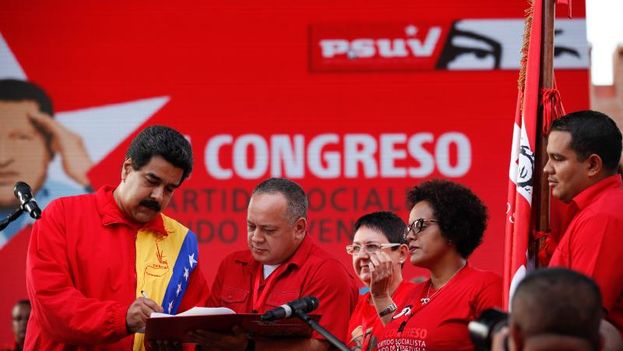
![]() 14ymedio, Havana, 7 December 2015 — Javier Antonio Vivas Santana, a columnist for the Chavista site Aporrea, is demanding the resignation of the president of Venezuela in a hard-hitting article titled “Maduro and Cabello must resign!”
14ymedio, Havana, 7 December 2015 — Javier Antonio Vivas Santana, a columnist for the Chavista site Aporrea, is demanding the resignation of the president of Venezuela in a hard-hitting article titled “Maduro and Cabello must resign!”
The author, who has a bachelor’s, master’s and doctorate in Education, and who from 2003 to 2012 worked as a teacher at the Sucre Mission, reflects on how “clear and predictable” Sunday’s election results were. Vivas Santana believes that the victory of the opposition in this election “is not only a parliamentary defeat,” but “Maduro received a setback in terms of popular acceptance.” And he recalls, “As in 2013, the elections of mayors were approved by Maduro and now these same people, have told him that his leadership as head of the National Executive has been disastrous, sectarian, corrupt and vulgar.”
In his column the Venezuelan ruling party is called a “retrograde leadership,” which, instead of taking “urgent measures for the operation of the State,” preferred “to play Russian roulette” in hopes that “oil prices would rise and so it would be able to supply the basic needs of the population.” What happened, said the columnist, was that they exhausted “the monetary reserves in the midst of an economic recession, coupled with terrible shortages and a perverse inflation.” The final result is apolitical, “leading to the accelerated impoverishment of the population.”
The failure of the government’s management should lead Maduro and Cabello to resign, says the writer. Failure to do so could “kill the Bolivarian Revolution,” although earlier he warns, “the people should constitutionally strip them of their functions,” to avoid, “Chavez being erased from the historic, political and social imagination of the Bolivarian people, because of them.”
Targets of the text include the so-called social policy of the government: the fact that “they gave away homes, taxis, electronic equipment, stoves, refrigerators and even food,” creating “a cronyism effect between the government and the voters.” Vivas Santana proposes that the new National Assembly “prohibit by law such donations during election campaigns,” because “supplying resources to citizens from the State budget cannot be used as a political tool.”
For Vivas Santana, the real social policy is one where “education and healthcare are a priority for the state, and where inflation is removed from the economy.” The only way, in his judgment, is to “create a space for wages as a source of social development.” To achieve this there will have to be a mandatory process “of coming to an understanding between the new National Assembly and the Maduro government,” the author reflects.
The article joins a broad trend within Chavismo that sees the management of Nicolas Maduro as a betrayal of the precepts of their “eternal Comandante.” Within this line of thinking is the so-called Socialist Tide, which proposes “avoiding the collapse of the revolution,” and yet that has failed to find support or recognition from the existing ruling party.
“On December 6, 1998, Hugo Chavez came to power by force of the people,” says the writer, who immediately notes that “17 years later the people have spoken again.” The text concludes with a categorically disappointed phrase: “Anyone who has eyes can see it.”
